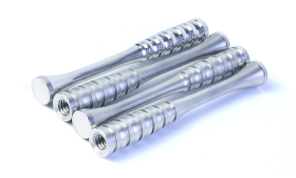The Importance of Quality Control in CNC Machining for Auto Parts Production
Precision, Efficiency, and Safety Depend on Rigorous QC Standards
In the fast-paced world of automotive manufacturing, CNC (Computer Numerical Control) machining plays a pivotal role in producing high-precision auto parts. From engine components to transmission systems, the accuracy of these parts directly impacts vehicle performance, safety, and longevity. As demand for efficiency and reliability grows, quality control (QC) in CNC machining has become more critical than ever.

Why Quality Control Matters in CNC Machining
1.Ensuring Precision & Consistency
Automotive parts require tight tolerances (often within microns) to function correctly. A minor deviation can lead to part failure, increased wear, or even safety hazards.
Advanced metrology tools, such as CMMs (Coordinate Measuring Machines) and laser scanners, verify dimensions against CAD models to maintain consistency.
2.Reducing Waste & Costs
Defective parts lead to scrap, rework, and delays, driving up production costs.
Implementing real-time monitoring and statistical process control (SPC) helps detect errors early, minimizing material waste.
3.Meeting Industry Standards & Regulations
Auto manufacturers must comply with ISO 9001, IATF 16949, and OEM-specific requirements.
Proper QC ensures parts meet safety, durability, and performance benchmarks, avoiding costly recalls.
4.Enhancing Customer Trust
High-quality CNC-machined parts improve brand reputation and customer satisfaction.
Consistent quality reduces warranty claims and strengthens long-term partnerships with automakers.
Key QC Techniques in CNC Machining
1. First Article Inspection (FAI) – Verifies the initial batch before full production.
2. In-Process Inspection – Uses probes and sensors to monitor machining in real time.
3. Post-Process Testing – Includes hardness tests, surface finish analysis, and stress testing.
4. Automated Vision Systems – Detect microscopic flaws invisible to the human eye.
The Future: AI & Smart Manufacturing
With the rise of Industry 4.0, AI-driven predictive analytics and IoT-enabled CNC machines are revolutionizing QC. These technologies enable self-correcting machining processes, reducing human error and boosting efficiency.
Quality control in CNC machining is not just a step in production—it’s a competitive advantage. As automotive technology advances, manufacturers who invest in cutting-edge QC systems will lead the industry in precision, reliability, and innovation.
For auto parts suppliers, prioritizing QC means delivering safer, higher-performing vehicles—one precision-machined component at a time.


